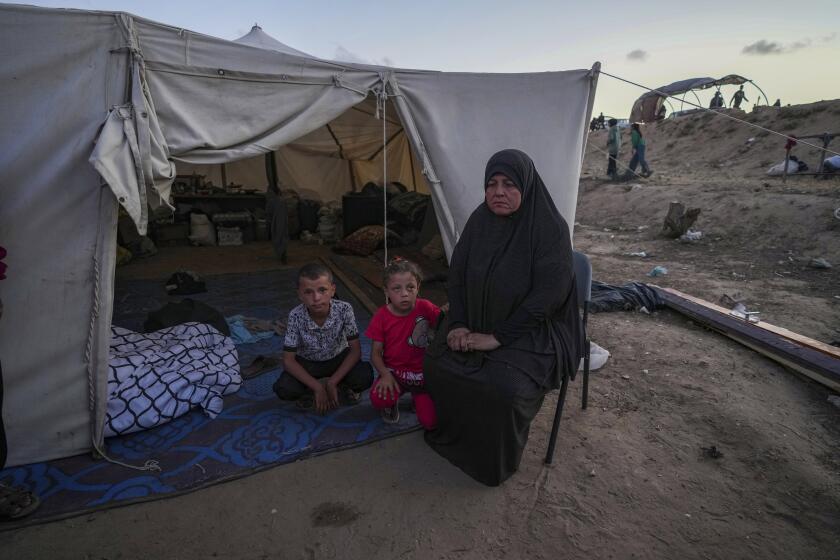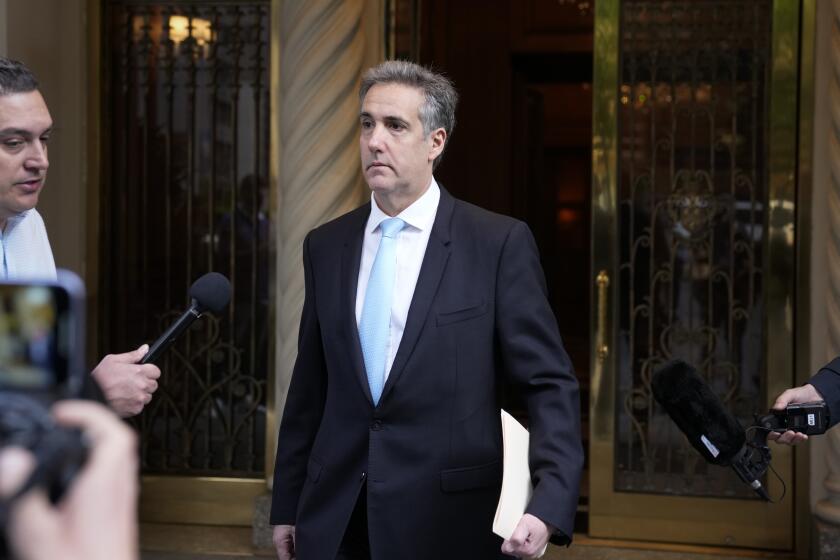Afghan Accord Ready for Signing in Geneva : Change in U.S. Policy Triggered Agreement
When Soviet leader Mikhail S. Gorbachev offered in early February to remove all 115,000 Soviet troops from Afghanistan, the Reagan Administration was caught in an awkward, curious situation.
In theory, the Administration should have been overjoyed: Gorbachev was proposing the first full-scale withdrawal of Soviet troops from another country in more than three decades. It amounted to a major reversal and strategic defeat for Moscow--one for which the Reagan Administration might claim some credit.
Yet in Washington, the Administration suddenly found itself under attack from the political right. Conservative leaders suggested that the United States, in pledging earlier to reciprocate for a Soviet pullout by ending its support for Afghan rebels, was on the verge of abandoning the resistance groups while they were still highly vulnerable.
Abrupt Change, Acceptance
Now, however, the Administration seems to have finally escaped from this dilemma. Over the past two months, it has managed to execute an abrupt change in its policy toward Afghanistan--and has managed to persuade Gorbachev to accept it.
On Thursday, Gorbachev and Afghan leader Najibullah announced that all the obstacles to a peace settlement in Afghanistan had been resolved, clearing the way for the Soviet Union to begin withdrawing its troops May 15. With that announcement, Gorbachev served notice that he is willing to accept the United States’ recently developed, tougher terms for an Afghan settlement.
Clearly, the Reagan Administration is delighted. A senior official told reporters Friday that such a settlement will be “a major achievement.”
“It certainly will improve the general atmosphere at Moscow, I think,” said this official, referring to the summit meeting between Reagan and Gorbachev next month. “And it may even improve the chances (that) we can achieve success in other regional issues, or other issues on the agenda.”
At the State Department, spokeswoman Phyllis Oakley said Friday: “We certainly welcome the reports out of Geneva that progress is being made on an Afghan settlement. We understand the final details of the accords were completed, but we’ve not had the opportunity to study the final text. As the White House said yesterday, President Reagan is cautiously optimistic, but we all do want to see the fine print.”
The crucial unresolved issue on Afghanistan had been what to do about the Soviet military supplies to the Afghan government and the U.S. supplies for the guerrilla groups while the Soviet troops withdraw from the country.
On the one hand, the regime headed by Najibullah is so dependent on Soviet arms and supplies that no one believes it could survive for more than a couple of weeks without them. On the other hand, American support for the moujahedeen, the Afghan guerrillas, has also been massive.
Largest Since Vietnam
The U.S. arms shipments to the Afghan resistance have been estimated at more than $600 million a year, the largest single covert operation since the Vietnam War. The American aid has included not only small arms and equipment, but such high-technology items as Stinger anti-aircraft missiles.
Two years ago, at a time when it seemed that the Soviet troops might be prepared to lodge themselves in Afghanistan for decades, the Reagan Administration made a pledge aimed at inducing a Soviet withdrawal. U.S. officials declared that whenever the Soviet Union began withdrawing its troops from Afghanistan, the United States would cut off its aid to the Afghan resistance.
In early February, when Gorbachev first proposed a pullout of Soviet forces beginning May 15, State Department officials reaffirmed this pledge, saying that as soon as the Soviet withdrawal was “irreversible,” the U.S. aid to the moujahedeen would cease.
But the Afghan guerrillas and their supporters in Washington lobbied hard to make sure the flow of American aid would not be shut off. “By cutting off the aid, they will crush the resistance,” declared Eshan Jan Areef, the Washington representative of one of the leading Afghan resistance groups.
New U.S. Demand
Soon, the Reagan Administration, responding to these complaints, began to insist on a new condition: that the Soviet Union stop supplying aid and equipment to the Afghan government.
At a congressional hearing Feb. 25, Deputy Assistant Secretary of State Robert A. Peck repeated the pledge of a cutoff in American aid to the guerrilla groups, but then added, “We would expect the Soviet Union to show reciprocal restraint . . . in stopping its military support for the Kabul regime.”
Thus was derived what the Reagan Administration called its policy of “symmetry”--the U.S. policy on arms supplies to Afghanistan should be roughly equivalent to the Soviet policy. At first, the United States proposed that each of the two superpowers impose a moratorium on new arms shipments into Afghanistan, a policy that U.S. officials later termed “negative symmetry.”
But Soviet officials balked at this new American condition. “The Soviet Union has its obligation to the Afghan government, and that obligation is based on . . . a treaty signed by the Soviet government and the Afghan government,” Soviet Foreign Minister Eduard A. Shevardnadze said at the time. “Those are legitimate supplies, and we are not going to review that treaty.”
‘Positive Symmetry’
In the face of this Soviet opposition, the United States then switched to a different suggestion, which it called “positive symmetry”--the Soviet Union would continue to provide arms to the Kabul regime and the United States would keep on supplying the resistance groups.
This U.S. policy seemed to run counter to the American declarations of two years ago, however. It ran the risk that the Soviet Union could decide to hang on indefinitely in Afghanistan--or might just withdraw unilaterally without any formal agreement in a way that might permit them to come back.
But the Reagan Administration gambled that Gorbachev was so eager to get the Soviet troops out of Afghanistan that he would go along with the new idea of continuing American arms shipments.
When Gorbachev first proposed the withdrawal, a high-ranking State Department official quipped that the Soviet leader “almost sounded like Lyndon Johnson in 1968.” He was alluding to Johnson’s decision to begin extricating American troops from Vietnam.
That reading of the Soviet leader turned out to be correct. On Thursday, despite the new American conditions, Gorbachev served notice that he will do what he announced last February, and that the Soviet troops will pull out, even if the American aid to the moujahedeen continues.
More to Read
Start your day right
Sign up for Essential California for news, features and recommendations from the L.A. Times and beyond in your inbox six days a week.
You may occasionally receive promotional content from the Los Angeles Times.






